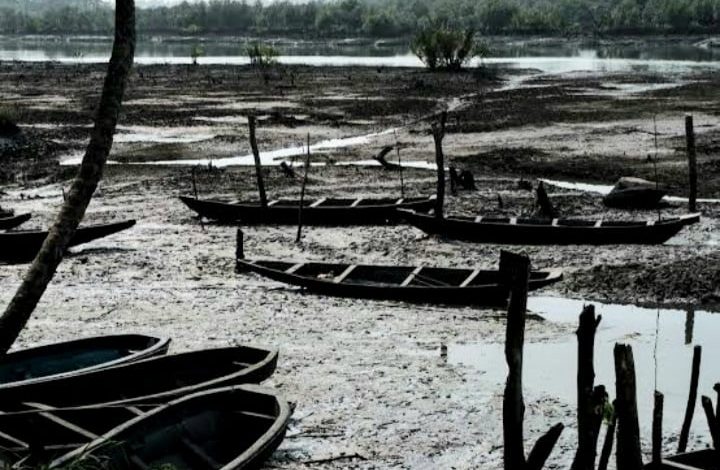Abandoned Oil Facilities Posing Threat in Niger Delta Communities, Expert Cautions

There is rising concern across the Niger Delta region over the number of abandoned oil wells, as well as unused and derelict infrastructures of multinational oil companies.
Experts say the situation poses serious health and environmental dangers on oil-producing communities.
In Akwa Ibom State alone, over 32 oil wells are said to have been abandoned.
The facilities are located in the Oko, Okoroette and Utapete communities of the state.
Also, the onshore oilfield located in Oloibiri, Ogbia Local Government Area of Bayelsa State, has been abandoned with about 21.26 million barrels of hydrocarbons.
An environmental expert, Dr Nninmo Bassey, reacting to the issue, pointed out that there were several well-heads, manifolds, flow stations and pipelines across the Niger Delta that needed to be changed and decommissioned having stayed decades unused and unattended to.
Bassey expressed worry over the state of abandoned oil wells, as well as the unused and old infrastructure of the IOCs and called on them to consider the environment and the well-being of Nigerians living in the areas.
According to him, “There are several wellheads, manifolds, flow stations, and pipelines that ought to be decommissioned and removed from communities across the Niger Delta region by the IOCs and the NNPC.
These derelict facilities constitute ecosystem impacts, and groundwater contamination and threaten human health.
Nigerian laws and regulations require proper decommissioning and removal of all unused oil facilities according to the best international standards. These requirements are often ignored.
Bassey, however, described the situation as time bombs that have already started to explode, citing the blow of Aiteo’s Nembe/Santa Barbara Well-1 in the Santa Barbara River, in OML 29 (Bayelsa State).
The Santa Barbara blow raged for 39 days, and the official/industry estimate was that less than 5,000 barrels were spilt.
But independent experts estimated that over 500,000 barrels of hydrocarbon fluids, gas and oil were spilt in the monumental incident,” he added.
He also cited the aged Trinity Spirit FSPO that exploded and sank in February 2022, noting that numerous well-head leaks have been recorded across the region.
He further mentioned the ignored “Ororo-1 well Fire in Ondo state in shallow water Oil Mining Lease (OML) 95 and demanded that the fire should be extinguished.
The Ororo-1 well has a long and chequered history. This oil well was first drilled by Chevron Corporation but was shut off in the 1980s with a steel plug due to pressure issues, according to reports.
The well was awarded as a marginal field to Guarantee Petroleum and its partner, Owena Oil & Gas Ltd (an Ondo State company) in 2003 but the award was allegedly revoked in 2019 because the company had not developed and brought the field to full production before the expiration of an extension period that elapsed in April 2019.
Owena Oil & Gas Ltd filed a lawsuit against the DPR over the revocation.
Interestingly, the well was re-entered by the new ‘owners’ in 2020 and the horrific blowout occurred on 15 May 2020.
Note that the well was re-entered decades after it had been plugged by Chevron. The Nigerian government effectively took ownership of (controlling) the fire since it had revoked the rights of Guarantee Petroleum to the field by the time of the disaster.
Experts suspect that the blowout occurred due to a sudden rush of hydrocarbons under high pressure and the failure of both the Blow Out Preventer (BOP) for the main well and the BOP between the pipe and the skin of the well.
The blowout which occurred on the Hydraulic Workover rig (Grace-1 HWU) hired by Guarantee Petroleum has been accompanied by the oil spill and a constant inferno since the blowout.
Bassey also noted that the abandonment does not only occur in the oil and gas sector but in the solid minerals sector as shown in the abandoned Tin mines of Jos and the Coal Mines of Enugu and called on the federal government to look into the ugly trend.
The expert slammed the Federal Government for its over-dependence on the IOCs, saying that such an attitude had deepened the dysfunctional petroleum sector and empowered the IOCs to engage in reckless corporate behaviour.
The heavy dependence of the Federal Government of Nigeria (FGN) on IOCs and oil revenue has inexorably entrenched the non-transparent, corrupt, and strategically dysfunctional petroleum sector.
This is the core enabler of the sort of reckless corporate behaviour that pervades the sector and by extension the nation.
This misbehaviour has rendered the relevant regulatory agencies either impotent or complicit in the malaise,” he fumed.






